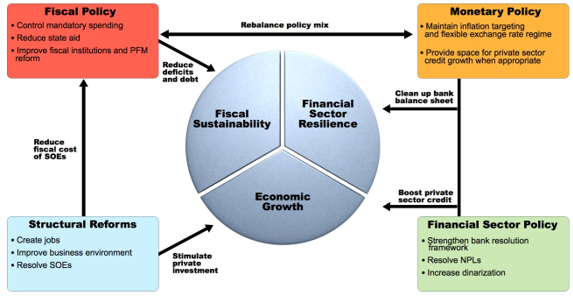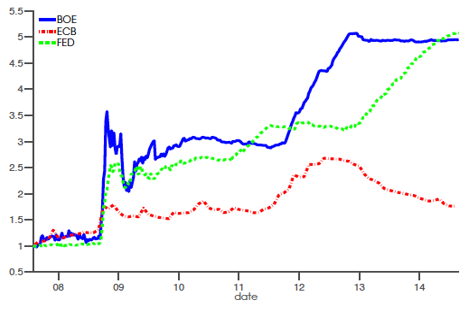Role Of IMF & ECB In Greece Crisis
Mar 11,22Role Of IMF & ECB In Greece Crisis
Question:
What have been the main roles performed by the International Monetary Fund (IMF) and the European Central Bank (ECB) in resolving the financial crisis experienced by Greece in recent years?
Answer:
Introduction
Role of IMF and ECB to Resolve Financial Crisis of Greece
Student Name:
Student Id:
Module Name:
Table of Contents
Introduction. 2
Discussion. 2
Conclusion. 6
References. 7
Introduction
International monetary fund’s and European central banks are the international organization that plays a major role during the financial crisis of a country. The international monetary fund helps the country by providing those funds in an emergency situation. These emergency funds help the country to avoid unbounded default. These organizations help the country to overcome the crisis situation which results from a disaster. Sovereign debt is the debt of the ruling government of the country. This debt can be categorized as either internal or external debt of the country which can be resolved by the international organizations named IMF and ECB. Recently, Greece is under sovereign debt and unable to pay the bills and it is caused due to loans granted for different organizations and then getting low interest through which this country goes under a financial crisis situation.
Discussion
International monetary fund
IMF is an international organization that improves the global economical operations for 190 countries. This organization also provides loans for the countries and also performs some programs which improve the income inequality in the country and also contribute to the development of the country (Lang, 2021). This organization also promotes employment in the country and also helps to develop economic growth in a sustainable way. IMF also helps to facilitate the trades in an international market through which the business process of a country also developed. This international organization also secures the financial condition of a country. The organizational structure of the IMF is created by the board of directors at the top position. This international organization was established in the year of 1944 after the great depression situation occurred in 1930.
Role of IMF
The major roles of this international organization are discussed in this section. This international organization works as a financial firefighter and also supports the country in its financial crisis and also provides health security globally (Kentikelenis et al., 2020). This organization enhances employment and also promotes exchange stability to develop the country. IMF also improves income growth and also facilitates the payment process inside the country. This international organization also establishes a multilateral system inside the country. This organization also prioritizes the health care projects in the particular country to improve the health condition of the citizens of the country (Sobhani, 2019). This governing body takes some important initiatives to improve and strengthen the effectiveness inside the country.

Figure 1: International monetary policy functions
Source: (Sobhani, 2019)
European central bank
The European central bank was established in the year of 1998 and the headquarter of this governing body is in Germany. Under this governing body, there are 4 decision-making boards of directors. This organization also defines the system of 19 European countries. The mission of this governing body is to maintain the stability of the prices inside the country. This organization is the successor of the monetary institution of Europe. It also responds to different financial issues running in different countries. It is the major institute of the entire Euro zone. It also creates monetary policies to stabilize the prices and also strengthen the Euro system.
Role of ECB
The major role of the ECB is to stabilize the money and also make it safe. This organization also measures the risk of climate in a sensible way and it also supplements the inflation target and enhances the credibility and also measures the policies (Bremus, Dany-Knedlik & Schlaak, 2020). This organization also fosters the supervision activities of the banks (Annunziata, 2019). ECB also contributes to the safety of the banking system. This organization also helps to control the inflation flow in the country. This international governing body uses the Euro through which it operates the monetary operation of 19 countries.
This organization also predicts the inflation level and also makes sure that this level also gets low. This organization also provides safety to the banking system of the country. The ECB supervises the banking system in a constant way and also in a standard manner. This organization also issues euro notes and also develops them. This organization also adopts new technology which helps to protect the euro notes and also makes it resistant.

Figure 2: performance of ECB during crisis
Source: (Bremus, Dany-Knedlik & Schlaak, 2020)
The way through IMF and ECB resolve financial crisis faced by Greece
Currently, Greece is facing some financial crisis and the estimated debt of this country is 19.6 percent of total domestic product. This country needs a repayment method to maintain sustained growth. The identified problem is the unbounded structure and delay of the tax revenues of the ruling government. The evasion of the systematic tax system causes problems in the internal structure of this country. Greece needs a transformation to overcome the situation and also rebuild the strong network system inside the country and this is the reason this country seeks help from the two other governing bodies like IMF and ECB.
Greece adopts austerity measures to return the unpaid loans and this is suggested by the ECB. Various private investors have loaded nearly 320 billion Euros from Greece which caused the bankruptcy. The IMF allocates emergency funds to this country to overcome the situation and also helps to increase the economic condition. The ECB provides cheap loans and reduces the interest rate through which this country gets help to overcome the situation. The ECB also helps this country by supervising the banking systems of this country. Greece also implements some financial policies and also gets help from the IMF to overcome the situation. This organization also helps to run the financial activities in a smooth way across the borders and also inside the country as well. This organization also provides solutions to the risks and also balances the financial system.
Conclusion
After going through the entire assessment it can be concluded that Greece is facing some financial crisis which also recovered through the intervention of the IMF and ECB. These organizations help to overcome the crisis situation. The IMF provides financial support to this country during the crisis situation which helps this country a lot. ECB provides a low-interest rate which also helps this country to repay and also helps this country to pay the loan amount. After getting help from these organisations Greece becomes able to overcome the crisis situation and also able to rebuild the structure.
References
Annunziata, F. (2019). Fostering Centralization of EU Banking Supervision Through Case-Law. The European Court of Justice and the Role of the European Central Bank. The European Court of Justice and the Role of the European Central Bank (April 15, 2019). Bocconi Legal Studies Research Paper, (3372346). DOI: https://dx.doi.org/10.2139/ssrn.3372346
Bremus, F., Dany-Knedlik, G., & Schlaak, T. (2020). Price stability and climate risks: sensible measures for the European Central Bank. DIW Weekly Report, 10(14), 206-213. DOI: http://dx.doi.org/10.18723/diw_dwr:2020-14-1
Kentikelenis, A., Gabor, D., Ortiz, I., Stubbs, T., McKee, M., & Stuckler, D. (2020). Softening the blow of the pandemic: will the International Monetary Fund and World Bank make things worse?. The Lancet Global Health, 8(6), e758-e759. DOI: https://doi.org/10.1016/S2214-109X(20)30135-2
Lang, V. (2021). The economics of the democratic deficit: The effect of IMF programs on inequality. The Review of International Organizations, 16(3), 599-623. Retrieved from: https://link.springer.com/article/10.1007/s11558-020-09405-x
Sobhani, S. (2019). From privatization to health system strengthening: how different International Monetary Fund (IMF) and World Bank policies impact health in developing countries. Journal of the Egyptian Public Health Association, 94(1), 1-4. Retrieved from: https://jepha.springeropen.com/articles/10.1186/s42506-019-0013-x





